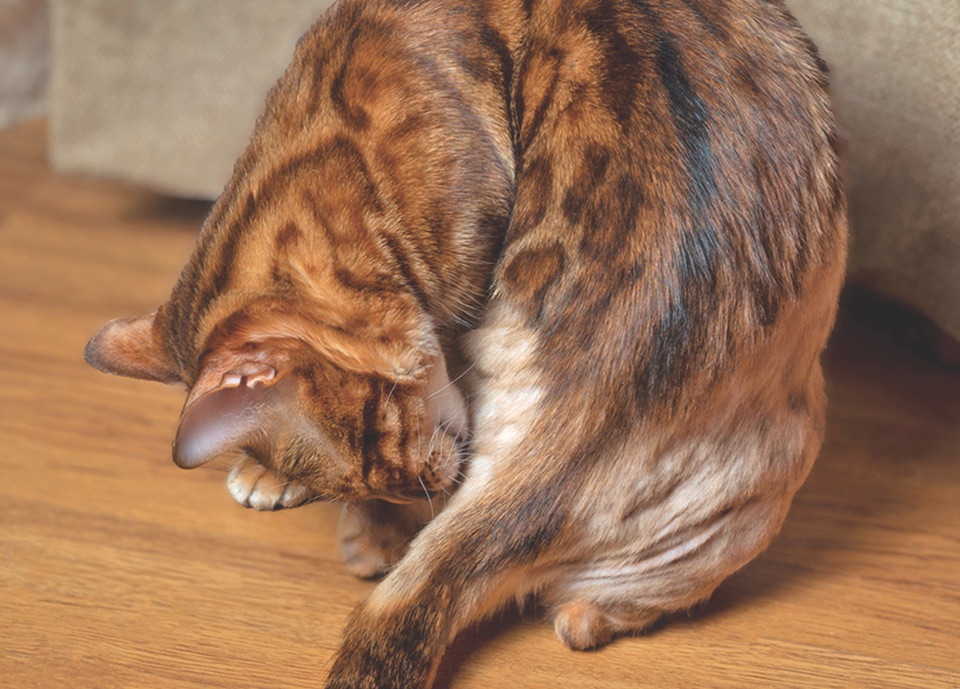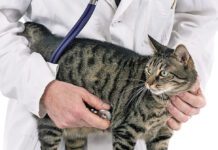Q. I have a 1-year old female cat that is scratching a lot in her neck area. I give her Revolution plus flea-and-tick medicine every month. She has bald spots behind both of her ears now, which concerns me. My veterinarian checked for ringworm, and it came out negative. He is also doing a culture, but I haven’t gotten the results. Other than that, she is in excellent health. What would cause the scratching? Do all cats scratch?
A. Thanks for getting in touch, and I am very sorry to hear of your cat’s dermatologic issue.
While it is normal for cats to scratch occasionally, it is not normal for them to do this frequently and/or to the extent that it results in loss of hair (alopecia). It’s important to realize that alopecia can be due to a primary problem with either hair growth or non-traumatic hair loss (as can be seen rarely in cases of immune-mediated diseases, metabolic diseases like hyperthyroidism, and secondary to stress) or to self-inflicted traumatic damage to the hairs. The latter is more common in cats, and since it sounds like your cat is actively scratching around the ears, it is reasonable to assume that the alopecia you are seeing is due to trauma to the hairs as a result of scratching.
The first thing to do would be to rule out the more common causes of scratching, as we have discussed in this issue (pages 1 and 4). It sounds as if you have ruled out the most common external parasites (ear mites and, I presume, flea infestation, which can cause significant scratching in cats that may be allergic to flea saliva), but there are other less common external parasites like lice and mites (i.e., Cheyletiella, Notoedres, Demodex species) that can also cause scratching in cats.
I presume that the culture you are referring to is a culture of an ear swab to determine whether there is evidence of a bacterial or fungal infection in the external ear canal (otitis externa). These infections are commonly associated with inflammation in the external ear canal and sometimes by an accumulation of exudate (discharge, pus), and looking at samples of such discharge under a microscope can sometimes provide information that can help rule out bacterial and/or fungal infections while you await the results of cultures.
If these diagnostic tests do not provide an answer, the next thing to consider is whether this may be due to an allergy. The itchiness caused by allergies to either food or inhaled allergens (called atopic dermatitis, like hay fever in people) can cause cats to scratch.
Ruling out a food allergy requires systematic dietary elimination trials during which novel dietary protein sources (i.e., different than that currently being offered) are offered for a minimum of eight weeks, with close monitoring to see whether the elimination of specific protein sources are associated with improvements in itchiness.
If switching to a novel protein source eliminates itching, this suggests that an allergy to the eliminated protein was the cause of the itching. In some cases, feeding what are called hydrolyzed diets, which contain proteins that have been enzymatically “chopped up” into smaller pieces, hopefully to the extent that they no longer cause an allergic reaction, can be attempted if novel protein source food trials are not successful.
Arriving at a diagnosis of atopic dermatitis usually involves ruling out other potential causes of itchiness, and consultation with a veterinary dermatologist can be helpful in determining which allergens a cat may be reacting to (often with the use of skin testing and measurement of blood-borne antibodies to particular proteins) and how best to treat and any potential allergies identified.
Finally, if the above potential causes of scratching are ruled out, consideration should be given to the possibility of either a metabolic disease like hyperthyroidism (less likely) or to stress-induced scratching. If the latter is the cause, consultation with a veterinarian and/or veterinary behaviorist regarding ways to minimize stress would help.
Please discuss these possibilities with your veterinarian, and send us an update when you can.




